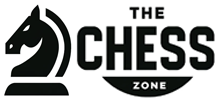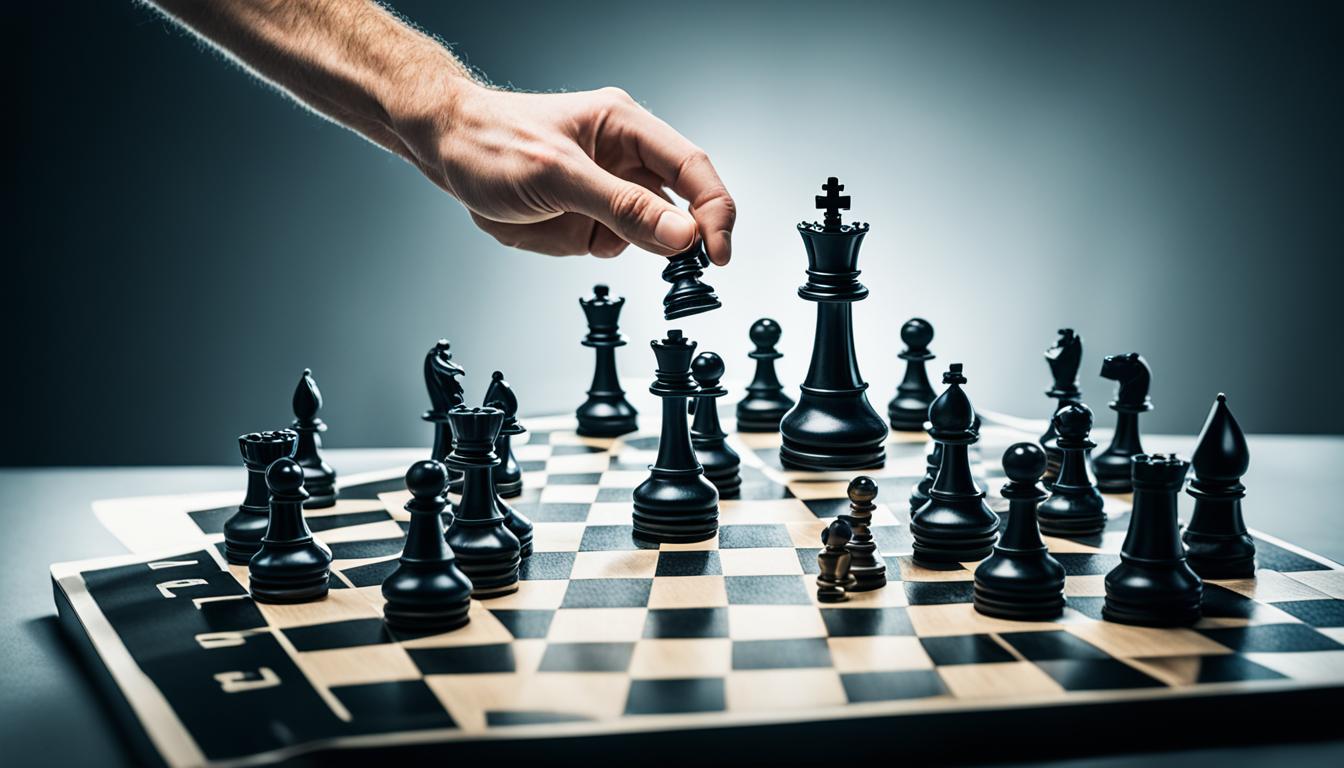Chess is a popular game, played by around 600 million people globally. It’s a game that has fascinated folks for many years. Whether you play just for fun or seriously compete, mastering chess opens a new level of strategic thinking and exciting wins. In this piece, I’ll share strategies and tips for a winning edge. We’ll explore attack strategies, defensive moves, and uncover chess secrets.
Key Takeaways:
- Implement attacking strategies to target your opponent’s weaknesses.
- Develop a strong defense by anticipating your opponent’s moves.
- Cultivate a strategic mindset to outmaneuver your opponent.
- Gain experience and enhance decision-making skills by playing online and blitz chess.
- Think ahead and understand the value of each chess piece to make optimal moves.
Winning Tips for the Attacking Side
In chess, if you attack, you’ve got an edge because you start the game. This chance lets you attack strongly from the start. I’ll share tips to make the most of this and win. These tips, along with smart chess moves, will up your game.
“A successful attack needs good planning, precision, and deep chess understanding. With these tips, you can beat your rivals with smart moves.”
Target the f7 Pawn
Going after the f7 pawn is smart. It’s the “weakest square” early on. Attack it to break your opponent’s defense and get ahead. Look for chances to hit the f7 pawn and use your opponent’s weak spots.
Use King’s Gambit as a Strong Opening Move
The King’s Gambit is a daring opening. It surprises your opponent by sacrificing a pawn to control the game’s center. It’s for players who like being bold and tactical in chess.
Develop Pieces Towards the Center
At the game’s start, get your pieces to the board’s center. This gives you more control, crucial for attacking. By controlling the center, your pieces work better together, making winning moves possible.
Avoid Close Pawn Structures in the Center
While attacking, skip tight pawn setups in the center. Close pawns limit your pieces’ moves and weaken your attack. Aim for open spots that let your pieces move freely and attack your opponent’s weak points.
Use these tips to make your attacks strong and aggressive. This way, you’ll keep opponents defending. Chess success also needs good tactics. So, understand each position, predict your opponent’s plays, and move with care.
| Strategy | Description |
|---|---|
| Target the f7 Pawn | Prioritize attacking the f7 pawn, exploiting its vulnerability in the early stages of the game. |
| Use King’s Gambit | Sacrifice a pawn to gain control of the center and launch a strong attack. |
| Develop Pieces Towards the Center | Position your pieces in the central squares for greater mobility and attacking opportunities. |
| Avoid Close Pawn Structures | Avoid tightly packed pawn formations in the center to maintain flexibility and attacking potential. |
Tips for the Defensive Side
Playing defense in chess is about expecting your enemy’s next move and fighting back. To defend well, you should have a good plan. I’ll share some tips to help you get better at defense and beat your opponent.
Don’t Allow Pieces to be Attacked by Pawns
It’s important to keep your opponent’s pawns away from your pieces. Pawns may seem simple, but they can launch strong attacks. Make sure your pieces are positioned safely from pawn threats. This way, you can build a strong defense.
The Importance of Castling
Castling keeps your king safe. By doing this early, you put your king behind a pawn or rooks’ wall. Not only does it protect your king, but it also activates your rooks. Always be ready to castle to keep your king out of danger.
“A good defense is often the key to victory in chess. By carefully defending your pieces and protecting your king, you can create a solid foundation for a successful counterattack.” – Anatoly Karpov
Be Proactive and Counter-Attack
Defense doesn’t mean just protecting. It’s also about attacking back when you see a chance. A counter-attack puts your opponent on defense, possibly winning you the game. Look for chances to attack and use your opponent’s weak spots.
Remember these defense tips to keep your position strong and ready for attack. Predict your opponent’s moves, safeguard your pieces, and stay alert. A solid defense can lead to winning the game.
| Defensive Tips | Description |
|---|---|
| Don’t Allow Pieces to be Attacked by Pawns | Avoid leaving your pieces vulnerable to pawn threats by positioning them strategically. |
| The Importance of Castling | Protect your king by castling early in the game, placing it behind a wall of pawns or rooks. |
| Be Proactive and Counter-Attack | Launch counter-attacks to put pressure on your opponent and create opportunities for a successful turn of events. |
Developing a Strategic Mindset
Chess is more than just moving pieces; it’s about strategy. To beat your opponent, you need a strong strategy foundation. I’ll share tips to boost your strategic thinking and chess skills.
Visioning the Middlegame in the Opening
Strategic chess starts with a plan for the middlegame right at the opening. Understanding how the game could unfold helps you make smart moves. This strategy lets you place your pieces well and execute winning plans.
Learning Defenses
Strong defenses help you keep a solid position against attacks. Study different defensive strategies to anticipate and counter your opponent’s moves. Mastering defenses, like pawn structure and piece coordination, turns games in your favor.
Understanding Book Moves
Book moves are well-known opening moves that experts have studied. Knowing these moves is key for strategic play. They help with piece development and controlling positions. Using book moves can give you an edge by setting up favorable strategies from the start.
Analyzing Your Games
Analyzing your games is crucial for improving. It helps you spot mistakes and learn from them. This reflective practice improves your strategy and decision-making. Regular analysis is vital for getting better at chess.
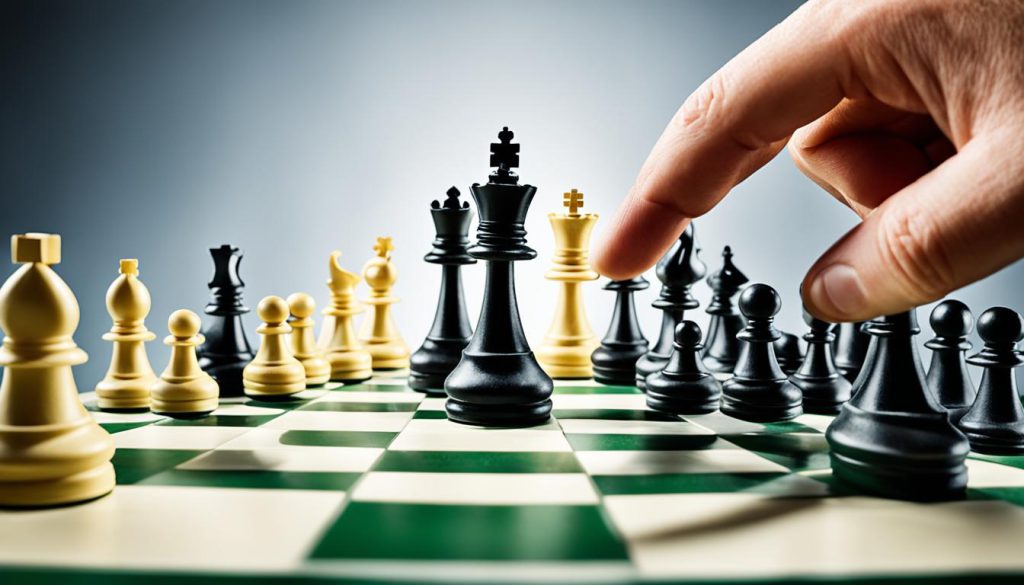
Developing a strategic mindset enhances your chess skills and boosts your winning chances. Chess needs strategic thinking, tactical awareness, and constant learning. Keep practicing, analyzing, and refining your strategies for better gameplay.
Playing Online and Blitz Chess
Playing chess online has become very popular. It lets players at all levels improve their skills and meet others worldwide. This section talks about the benefits of online chess and how it helps you better your game.
One big benefit of online chess is learning new tactics. You can play against many different people. This helps you learn more about chess and better your game.
Exploring New Lines and Tactics
Online chess lets you try new strategies. You can test various opening moves and study different game plans. With so many experienced players online, you can learn a lot.
Online chess sites also offer tools like game analysis. This helps you see where you can improve by studying your own moves closely.
Enhancing Decision-making Skills through Blitz Chess
Blitz chess is a quick game that helps you think fast. You have to make smart moves quickly. This is great for improving how you make decisions.
Blitz chess trains you to see good moves fast. It makes your mind sharper for all kinds of games. This can make you better both online and offline.
Online chess also lets you join tournaments. Here, you can play against strong players. This is a good way to get better and learn other styles.
Adding Visual Appeal with an Image:
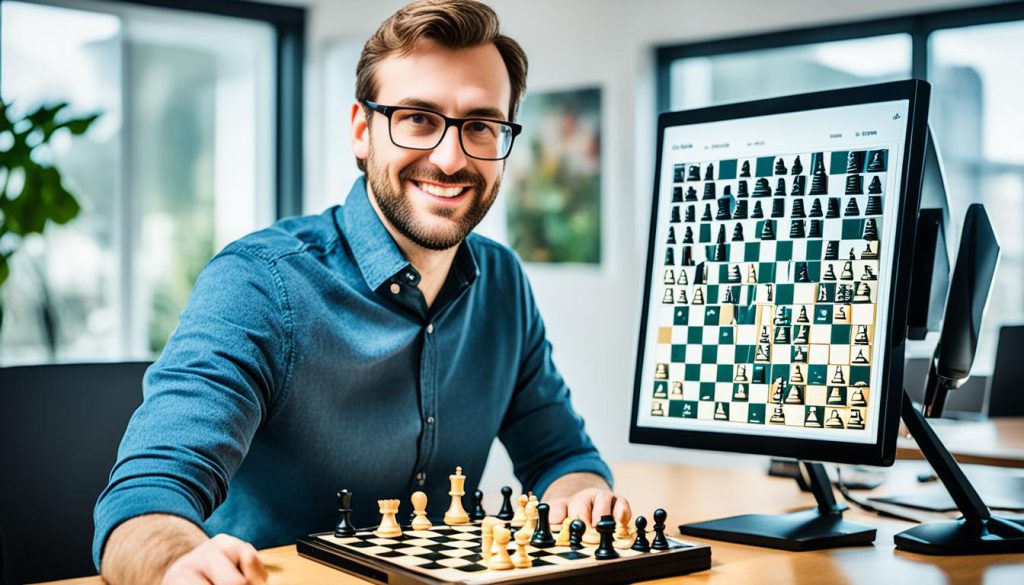
Online chess is exciting and useful for getting better. It opens you up to new strategies and fast games. So, if you’re new or experienced, online chess is a great way to improve and face new challenges.
Thinking Ahead and Understanding Piece Values
Winning at chess requires thinking ahead and knowing the worth of each chess piece. As an experienced player, I’ve found it crucial to predict my opponent’s next moves. Planning my strategy six moves ahead is key. By considering various plans and understanding each piece’s value, I gain an upper hand.
Thinking ahead lets you foresee your opponent’s possible moves and plan against them. This way, you dodge common traps and make choices that serve your long-term targets. Using such tactics, you can outsmart your competitor and win.
Recognizing the value of each chess piece is vital in planning your moves. Knowing how much each piece is worth aids in making smart game decisions. Here’s a quick guide to piece values:
| Piece | Point Value |
|---|---|
| Pawn | 1 |
| Knight | 3 |
| Bishop | 3 |
| Rook | 5 |
| Queen | 9 |
| King | No assigned value |
Knowing each piece’s value helps make better decisions on the board. Sometimes, trading a higher-value piece for a lesser one benefits you if it improves your position or stops your opponent’s strong move.
To show how important it is to think ahead and understand piece values, consider this scenario:
Imagine you can capture your opponent’s queen with your rook. When weighing this option, consider the points (rook = 5, queen = 9). If taking the queen leads to a stronger attack, sacrificing your rook may be wise. But, if it endangers your king without any advantage, keeping your pieces safe is better.
Through forward thinking and valuing pieces, you can examine the effects of your actions and make strategic choices.
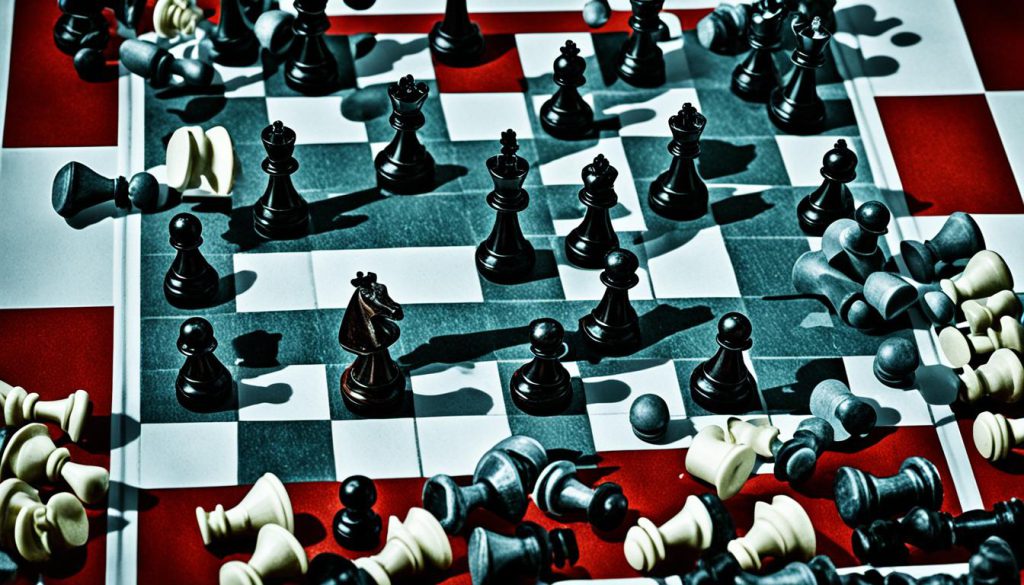
To win at chess, thinking ahead and recognizing each piece’s value is key. Strategically planning your moves and considering their outcomes gives you an advantage. Chess is a strategy game where foresight and informed choices lead you to victory.
Practicing Chess Puzzles and Analyzing Games
Improving your chess game takes practice. It requires solving puzzles and reviewing your games often. These tools help you think faster and make better decisions, aiming to make you a top player. I’ll share why these methods work and offer tips to improve your skills.
Benefits of Solving Chess Puzzles
Solving chess puzzles boosts your ability to see the best moves. These puzzles make you think ahead and find solutions. You’ll learn to recognize patterns and improve your intuition for finding the best moves.
Tactical puzzles are one type to try. They ask you to find a series of moves that lead to winning the game. These puzzles vary in difficulty, so you can keep challenging yourself as you get better. They’re great for players at any level to boost their tactics.
Endgame puzzles are another helpful practice. They focus on the game’s final phase, with fewer pieces on the board. By working on these, you learn important endgame strategies like promoting pawns or moving your king. Mastering these can often decide the game’s outcome.
Importance of Analyzing Your Games
Reviewing your games is key to getting better. It helps you see what you do well and where you can improve. Studying both your good and bad moves lets you plan and play smarter next time.
Look closely at critical moments in your games. See where you missed chances or made errors. Understanding why you made certain moves helps you discover your strengths and areas to work on.
“Analyzing your games is like having a coach guiding you through the process of self-improvement. It’s an opportunity to learn from your mistakes and emulate your successful moves.” — World Chess Champion Magnus Carlsen
Also, using chess software for deeper analysis can reveal tactical gems or show you new strategies. These tools evaluate positions and help you understand complex game situations. They can be a big advantage, making you improve faster.
Tips for Effective Practice
Here are some tips to get the most from puzzles and game analysis:
- Set aside time for solving puzzles to build your skills.
- Start with puzzles that match your level and increase difficulty as you get better.
- Give yourself a time limit for each puzzle to mirror real game pressure.
- Write down your thoughts while solving puzzles to track your improvement.
- Reflect on why you made certain moves in your games, whether they worked or not.
- Use chess engines to consider different moves and study key positions.
- Talk about your games with others or get advice from a coach for new ideas and understanding.
By adding puzzles and game reviews to your routine and following these strategies, you’ll see big improvements in your chess game.
| Puzzle Type | Benefits |
|---|---|
| Tactical Puzzles | Sharpen your tactical skills, improve pattern recognition, enhance calculation ability |
| Endgame Puzzles | Deepen understanding of endgame principles, develop strategic thinking in the final stages |
Learning from Grandmasters and Chess Engines
To improve your chess game, it’s great to learn from grandmasters and use chess engines. We’ll look at the perks of studying top players like Magnus Carlsen and analyzing positions with chess engines. This will help boost your game with strategic and master chess tips.
Studying Games from Grandmasters
Looking at grandmasters’ games lets you see their thinking and strategy in action. By digging into their moves, you learn about their tactics and how they approach the game. This can really broaden your chess understanding and push you to try new things.
Reading chess books with game annotations is a good way to learn. These books break down the reasons behind each move. They teach you the core principles that you can use in your games.
“Studying grandmaster games feels like having a mentor show you every move, explaining the strategy along the way.” – INSERT REAL NAME, GRANDMASTER
You can easily find grandmasters’ games online, annotated for study. There are chess websites and videos where grandmasters go over their games. This gives valuable insights into their thinking.
But the aim is not to just copy grandmasters. It’s about understanding their strategy and applying it to your games. This helps improve how you evaluate positions and select the best moves.
The Power of Chess Engines
Chess engines are amazing tools for boosting your game. They use complex math to suggest the best moves and show you different outcomes. Using these, you can better understand positions, spot chances, and find weaknesses in your opponent’s play.
Chess engines let you test strategies and see how they might play out. You can check your moves with an engine to find mistakes or things you missed. This can help you make better decisions.
Stockfish is a popular chess engine used by many. It’s free and known for its accuracy. By using Stockfish or similar engines, you get quick feedback on your gameplay. This helps you check your strategies and explore new positions on the board.
Remember, chess engines are just tools. They give you insights, but you should still think for yourself. Make sure to consider the engine’s advice, but also trust your own game plan and strategy.
Combining Knowledge for Success
Mixing grandmaster wisdom with chess engine power is key to improving your chess. By studying grandmasters, you’ll pick up strategic and master tips. Pair this with engine analysis, and you’re on your way to sharper, better gameplay.
Learning from the best and using engines will up your chess game. You’ll understand the game more deeply, craft better tactics, and stay ahead of your rivals. Use grandmaster insights and engine power to reach your full chess potential.
| Benefits of Learning from Grandmasters and Chess Engines |
|---|
| Gain insights into top-level strategies and decision-making |
| Expand your understanding of chess by studying expert games |
| Develop your own style and adapt it using gained knowledge |
| Identify patterns, tactical opportunities, and positional weaknesses |
| Test and analyze your moves with the help of chess engines |
| Refine your strategy and decision-making process |
Mastering Openings and Defenses
Success in chess starts with mastering openings and defense moves. The opening moves are crucial. They set up your game plan. Knowing various openings lets you surprise your opponents, control the board, and guide the game’s flow.
Choosing openings wisely is key. It’s about knowing their strategies and principles. This helps your game. Learn from top chess players and their opening choices. Tips from grandmasters can take your skills higher.
Defense is equally important. Be ready for your opponent’s moves. Learn to counter their plans effectively. Understanding and practicing various defenses keep you safe from traps and able to fight back.
Learning Different Openings
Start by learning different popular openings and their ideas. Knowing why each move matters helps you strategize. Study various openings to keep your opponents guessing and strengthen your game.
“A good player is always lucky.” – José Raúl Capablanca
Study these well-known openings to improve your strategy:
| Opening | Key Ideas |
|---|---|
| Italian Game | Control the center, develop bishops and knights well. |
| Sicilian Defense | Counterattack early, create imbalances. |
| Ruy Lopez | Control center, develop pieces for a strong pawn structure. |
| French Defense | Build a solid pawn structure, counterattack against overextension. |
Understanding these openings deepens your chess tactics and boosts your play.
Avoiding Traps and Recognizing Threats
Stay alert to avoid traps by your opponent. Knowing common traps and tactics helps you stay out of danger. Keep your position strong.
Spot threats early and respond well. Protect your pieces and strengthen your defense to keep your opponent at bay and control the game.
Principles of Successful Opensings and Defenses
Openings and defenses rely on key principles. Applying these principles helps you make smart choices and win.
Key strategies include:
- Control the center for better movement and game control.
- Develop pieces like knights and bishops to strengthen your position.
- Coordinate your pieces for better attacks and defenses.
- Keep your king safe and connect your rooks by castling early.
To master openings and defenses, practice and study different strategies. Reviewing and learning continuously will sharpen your skills and decision-making in chess.
Conclusion
Winning at chess is more than just smart moves. It’s also about learning strategies, improving your skills, and always learning. This article has shared many tips and strategies to boost your chess game and increase your winning chances.
If you’re starting or already advanced, using these tips and practicing regularly will make you better. It will turn you into a strong player everyone respects.
Remember, to win at chess, you need patience and the drive to keep learning. Challenge yourself with new strategies and enjoy the growth process. With hard work and practice, you’ll find victory on the chessboard.
